‘Watchmen’: The Show’s Biggest Risk Was Changing Hooded Justice
By the time HBO’s Watchmen wrapped up its first season, the TV show had become a ratings juggernaut. Based on the original 1986 graphic novel and created by screenwriter and producer Damon Lindelof (best known for his work on Lost, The Leftovers, Prometheus, and Star Trek Into Darkness), the series would go on to pick up more Emmy nominations in the 2019-2020 awards season than any other show. The show’s success among both audiences and critics came despite a very risky move made by Lindelof and his team concerning a major character named Hooded Justice.

‘Watchmen’ aired for one season in 2019
The story timeline for HBO’s show occurs just over three decades after the events that took place in the graphic novel. The series re-imagines the events of the real-life 1921 Tulsa race massacre and places the audience in the midst of present-day Tulsa as a white supremacist group wars against a masked Tulsa police.
“The original comic confronted the Cold War and the specter of nuclear annihilation,” explains NBC. “But the provocative new series … [tackles] racism and white supremacy, centering on an American-African woman (Regina King’s Sister Night) living in an alternate — but painfully familiar — version of recent American history.”
From the moment its pilot aired, Watchmen was an immediate success. “Bold and bristling, Watchmen isn’t always easy viewing, but by adding new layers of cultural context and a host of complex characters it expertly builds on its source material to create an impressive identity of its own,” summarized critic review aggregator Rotten Tomatoes.
Lindelof’s re-imaging of the original ‘Watchmen’ involved changing the Hooded Justice Character
The Hooded Justice character in Watchmen was the first masked hero who inspired the creation of the Minutemen (the superhero group in the comic series). He’s a well-known character in both the comic series and the previous Hollywood film adaptation that came out in 2009.
But it wasn’t until the sixth episode of HBO’s nine-episode Watchmen that Lindelof shocked audiences with a major twist: The Hooded Justice was actually Will Reeves (played by African-American actor Louis Gossett Jr.), a survivor of the Tulsa massacre and the grandfather of Angela Abar (Regina King), a Tulsa police detective who wears the disguise of a nun’s habit and goes by the name Sister Night.
“In [the] episode, ‘This Extraordinary Being,’ Watchmen evocatively reimagines the nature of superheroes and the original comic itself with the revelation that Will Reeves is Hooded Justice,” explains Vulture. “In making Hooded Justice a Black man and using his story to explore the perils of racism, the series strikingly departs from its source material, which had few people of color in its pages at all. Even then, it’s fitting for a comic that poised itself on political exploration and critique.”
Lindelof says his decision to reveal the race of the Hooded Justice was a major risk
“Making Hooded Justice a Black man was the scariest risk of the show,” reports Variety. The publication notes that Lindelof wanted to surprise audiences by having the Hooded Justice reveal his face for the first time every in Watchmen history. At the same time, Lindelof was reading author Ta-Nehisi Coates’ writing about America’s racist history.
“The two ideas collided, and suddenly Lindelof realized, what if Hooded Justice never showed his face because he was a Black man in America?,” explains Variety. “It scared me at first,” the director told Variety. “But I couldn’t shake it.”
Despite Lindelof’s worry about how audiences would take the twist, the revelation was well-received with the aforementioned Vulture saying the episode used “fine-tuned grace” to explore “anti-Black violence through a heartwrenching lynching scene, queer identity, and familial legacies of inherited trauma.”


